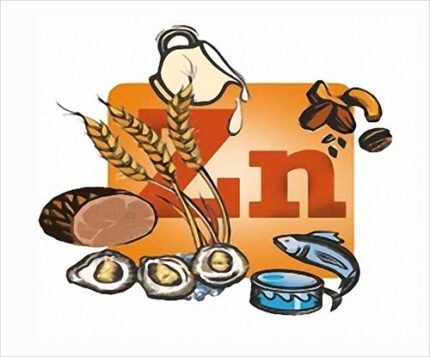Medically reviewed by Dr. Ramesh Gaddam, M.D. — Written by Sumalatha, D.N.H.E
What is Zinc?
Zinc is an essential mineral that plays a crucial role in various bodily functions, including immune system function, wound healing, DNA synthesis, and cell division. It’s important to include zinc-rich foods in your diet to meet your body’s daily requirements.
Zinc and its importance
- Zinc Overview:
- Essential mineral with the symbol Zn and atomic number 30.
- Found in nature and commonly mined from ore deposits.
- Biological Role:
- Crucial for various biological processes.
- Acts as a cofactor for enzymes, facilitating essential chemical reactions.
- Role in the Body:
- Key functions include DNA synthesis, immune system support, wound healing, and protein synthesis.
- Vital for cell division, taste, and smell perception.
- Dietary Sources:
- Obtained through diet; found in a variety of foods.
- Rich sources include meat (especially red meat), poultry, fish, dairy products, nuts, seeds, and legumes.
- Deficiency and Excess:
- Deficiency can lead to health issues such as growth retardation, delayed sexual maturation, and impaired immune function.
- Excessive intake can result in toxicity symptoms like nausea and vomiting.
- Supplements:
- Available as supplements, but caution is advised.
- Should be used under healthcare professional guidance to avoid excessive intake.
- Importance of Zinc-Rich Foods:
- A balanced diet incorporating zinc-rich foods is essential for meeting daily zinc requirements.
- Offers a natural and practical approach to support immune function, maintain healthy skin, and contribute to overall well-being.
Top Sources of Zinc
Meat:
- Beef
- Pork
- Lamb
- Chicken
Seafood:
- Oysters (particularly high in zinc)
- Crab
- Lobster
- Shrimp
- Fish (such as salmon and tuna)
Dairy:
- Cheese (especially cheddar and Swiss)
- Yogurt
Nuts and Seeds:
- Pumpkin seeds (also known as pepitas)
- Sesame seeds
- Cashews
- Pine nuts
- Almonds
Legumes:
- Chickpeas (garbanzo beans)
- Lentils
- Black beans
- Kidney beans
Whole Grains:
- Quinoa
- Oats
- Wheat germ
Vegetables:
- Mushrooms (especially shiitake and crimini)
- Spinach
- Kale
Fruits:
- Avocado
- Blackberries
Summary:
- It’s worth noting that the bioavailability of zinc (the amount that your body can absorb and use) can be influenced by the presence of certain compounds in foods.
- For example, phytates found in some grains and legumes can bind to zinc and reduce its absorption. Soaking, sprouting, or fermenting these foods can help enhance zinc absorption.
- If you have concerns about your zinc intake, or if you are considering zinc supplements, it’s always a good idea to consult with a healthcare professional, as excessive zinc intake can also have adverse effects.
If you follow a vegetarian or plant-based diet, there are still plenty of zinc-rich foods you can incorporate into your meals. Here are some vegetarian sources of zinc:
1.Legumes:
- Chickpeas (garbanzo beans)
- Lentils
- Black beans
- Kidney beans
2.Nuts and Seeds:
- Pumpkin seeds (pepitas)
- Sesame seeds
- Cashews
- Pine nuts
- Almonds
3.Whole Grains:
- Quinoa
- Oats
- Brown rice
- Wheat germ
4.Dairy:
- Cheese (especially cheddar and Swiss)
- Yogurt
5.Eggs:
- Eggs, particularly the yolk, contain zinc.
6.Vegetables:
- Mushrooms (especially shiitake and crimini)
- Spinach
- Kale
- Broccoli
7.Fruits:
- Avocado
- Blackberries
Zinc is an essential nutrient for infants, as it plays a crucial role in their growth and development. Here are some zinc-rich foods suitable for babies:
- Breast Milk or Formula:
- Breast milk or formula is the primary source of nutrition for infants, and it contains zinc in a form that is highly bioavailable.
- Meat:
- Pureed or finely minced meats, such as beef, chicken, turkey, or lamb, are good sources of zinc. Make sure the meat is cooked and appropriately prepared for the baby’s age and chewing ability.
- Fish:
- Pureed or finely minced fish, like salmon, can provide zinc. Fish is also a good source of omega-3 fatty acids, which are beneficial for brain development.
- Dairy:
- Full-fat plain yogurt and cheese are sources of zinc. Introduce dairy products according to the baby’s tolerance, usually starting after six months of age.
- Legumes:
- Mashed or pureed legumes such as lentils, chickpeas, and black beans can be introduced as a source of zinc.
- Eggs:
- Cooked and mashed eggs (starting with the yolk) can provide zinc. Ensure that eggs are fully cooked to avoid the risk of foodborne illness.
- Fortified Cereals:
- Iron-fortified cereals often contain added zinc. Check labels to choose cereals appropriate for your baby’s age.
- Whole Grains:
- Foods like oatmeal and quinoa can contribute to zinc intake. Introduce these grains based on the baby’s ability to chew and swallow.
When introducing solid foods to your baby, it’s essential to follow your pediatrician’s recommendations and guidelines for each stage of development.
Additionally, always be aware of potential allergies and introduce new foods one at a time to monitor your baby’s reaction.
If you have concerns about your baby’s nutrient intake, consult with your pediatrician for personalized advice.
Medically reviewed by Dr. Ramesh Gaddam, M.D.

General Physician, Diabetologist, and Critical Care Specialist.
Discover more from Health Build-Up
Subscribe to get the latest posts sent to your email.

9 thoughts on “Zinc: 28 Best Foods That Are High in Zinc, Benefits, Intake”
Comments are closed.